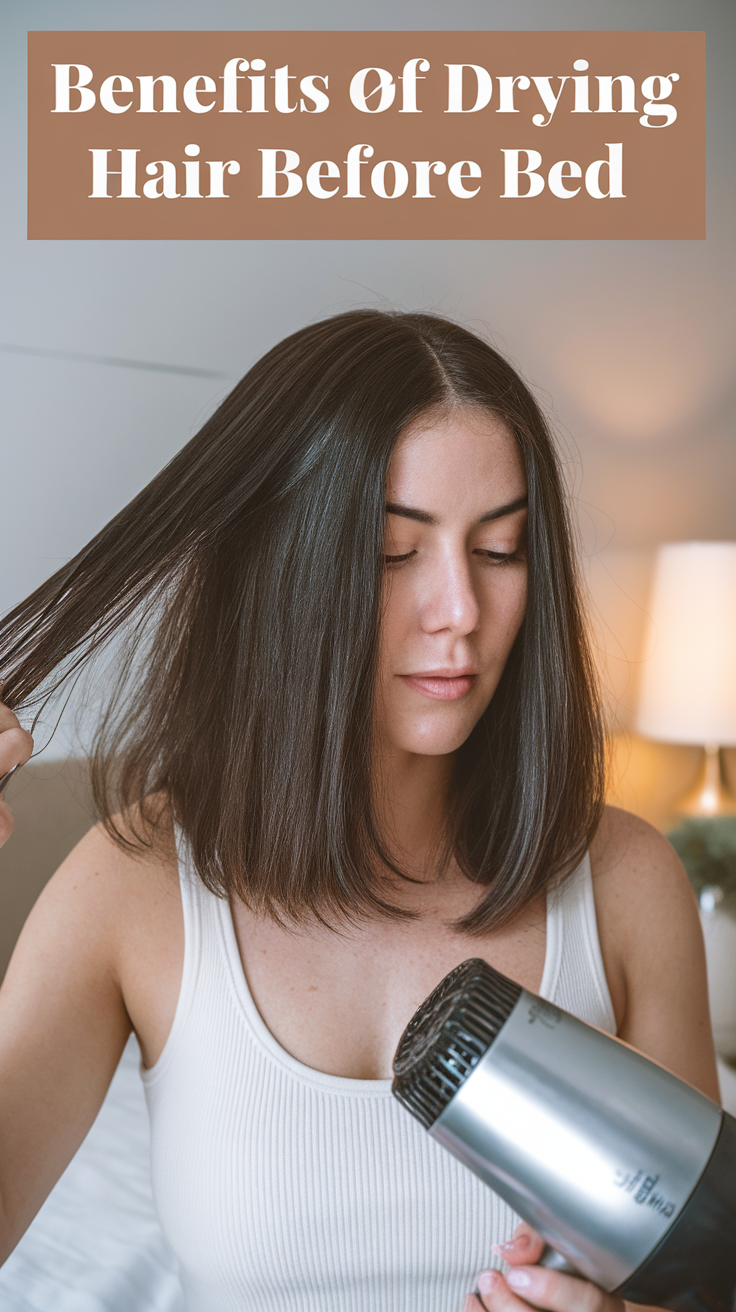Is Sleeping with Wet Hair Bad?
When your hair is wet, its structure becomes more vulnerable. The outer protective layer, the cuticle, softens, exposing the inner layers to potential damage. Tossing and turning at night can cause friction against the pillow, leading to split ends, frizz, and breakage.

Comparison of Wet vs. Dry Hair Durability
| Condition | Wet Hair | Dry Hair |
|---|---|---|
| Elasticity | High, prone to overstretching | Moderate, less vulnerable |
| Durability | Fragile, breaks easily | Stronger, resists breakage |
| Friction Risk | High with pillowcases | Lower due to reduced friction |
Tips to Prevent Damage
- Towel Dry Gently: Use a microfiber towel to blot away moisture without tugging.
- Protective Products: Apply leave-in conditioners or serums to shield hair overnight.
- Silk Pillowcases: These reduce friction, preventing unnecessary stress on your strands.
Impact on Scalp Health
Risks of Sleeping with Wet Hair
A damp scalp can become a breeding ground for bacteria and fungi. Prolonged exposure to moisture fosters conditions like dandruff or seborrheic dermatitis.
Common Scalp Issues Linked to Sleeping with Wet Hair
| Issue | Symptoms | Prevention |
|---|---|---|
| Dandruff | Flaky, itchy scalp | Dry hair before bed |
| Seborrheic Dermatitis | Red, scaly patches | Use anti-fungal shampoos |
| Bacterial Infection | Itchiness, sores | Avoid damp environments |
 Tips for a Healthier Scalp
Tips for a Healthier Scalp
- Dry Thoroughly: Focus on roots when using a hairdryer.
- Anti-Microbial Pillow Covers: These can help prevent bacterial growth from residual moisture.
Skin and Pillow Hygiene
Pillow Problems from Wet Hair
Moisture from your hair can seep into your pillow, creating a haven for mold, mildew, and allergens. Over time, this can lead to skin irritations and acne.
Practical Steps:
- Wash pillowcases frequently, at least twice a week.
- Use pillow protectors to create a barrier between moisture and your pillow stuffing.
Styling Issues When Sleeping with Wet Hair
Morning Challenges
If you’ve ever woken up with unruly hair after sleeping with it wet, you’re not alone. Wet hair molds to the shape of your pillow, causing kinks and frizz.

Tips for Manageable Morning Hair:
- Braid Loosely: This minimizes friction and keeps your hair somewhat tamed.
- Apply a Curl Cream: Enhance natural waves while reducing frizz.
Myths and Health Concerns
Can Sleeping with Wet Hair Make You Sick?
This is a common misconception. While damp hair doesn’t directly cause colds, the combination of moisture and a cool environment might make you feel uncomfortable or exacerbate sinus issues.
Conclusion: Should You Sleep with Wet Hair?
In my experience, avoiding wet hair at bedtime is worth the extra effort. While it might not immediately harm your health, the long-term risks to your hair, scalp, and skin are significant. Taking simple steps to dry your hair or using protective methods can make a big difference.
FAQs
1. Can sleeping with wet hair cause hair loss?
While not directly linked, frequent breakage and scalp conditions from sleeping with wet hair can contribute to hair thinning over time.
2. What’s the best way to dry hair before bed?
Use a microfiber towel or a low-heat hairdryer. Focus on the roots and let the ends air dry if short on time.
3. Can kids sleep with wet hair safely?
It’s best to avoid it, as children’s scalps are sensitive and may develop dandruff or irritation more easily.
4. Does hair texture matter?
Yes. Curly or coarse hair retains more moisture, making it more prone to frizz and fungal growth.
5. Are silk pillowcases worth it?
Absolutely! They reduce friction and moisture absorption, protecting your hair and skin.

